-
ORIGINAL ARTICLE09-24-2022
Spatial analysis of AIDS in the state of Maranhão: an ecological study 2011-2018
Revista Brasileira de Enfermagem. 2022;75(1):e20210131
Abstract
ORIGINAL ARTICLESpatial analysis of AIDS in the state of Maranhão: an ecological study 2011-2018
Revista Brasileira de Enfermagem. 2022;75(1):e20210131
DOI 10.1590/0034-7167-2021-0131
Views0See moreABSTRACT
Objective:
Analyze the spatio-temporal distribution of AIDS cases in Maranhão.
Methods:
Ecological study of AIDS cases in the Notifiable Diseases Information System, 2011-2018. Gross and adjusted incidences were calculated using the Baysean method; then, the Moran Global and Local Indices to observe the existence of spatial autocorrelation of the cases and for the delimitation of high and low risk clusters.
Results:
6,349 cases were reported, which were distributed heterogeneously. There was an advance of cases to new areas and persistence in old areas, such as in the capital São Luís and its surroundings. The dissemination did not occur at random, with positive spatial autocorrelation, with evidence of the formation of clusters in the municipalities of São Luís, São José de Ribamar and Paço do Lumiar.
Conclusion:
High-risk areas have been identified and should be considered a priority for investment in health, management, and organization of health services.

-
TECHNOLOGICAL INNOVATION09-24-2022
Transitional care from the hospital to the home in heart failure: implementation of best practices
Revista Brasileira de Enfermagem. 2022;75(1):e20210123
Abstract
TECHNOLOGICAL INNOVATIONTransitional care from the hospital to the home in heart failure: implementation of best practices
Revista Brasileira de Enfermagem. 2022;75(1):e20210123
DOI 10.1590/0034-7167-2021-0123
Views0See moreABSTRACT
Objectives:
Assess the compliance of the implementation of better evidence in the transitional care of the person with heart failure from the hospital to the home.
Methods:
Evidence implementation project according to the JBI methodology in a cardiology hospital in São Paulo. Six criteria were audited before and after implementing strategies to increase compliance with best practices. 14 nurses and 22 patients participated in the audits.
Results:
In the baseline audit, compliance was null with five of the six criteria. Strategies: training of nurses; reformulation of the hospital discharge form and guidance on self-care in care contexts; and making telephone contact on the 7th, 14th and 21st days after discharge. In the follow-up audit, there was 100% compliance with five of the six criteria.
Conclusion:
The project made it possible to increase the compliance of transitional care practices in people with heart failure with the recommendations based on the best evidence.

-
ORIGINAL ARTICLE09-24-2022
Characterization of obstetric care developed in teaching hospitals in a capital of northeast Brazil
Revista Brasileira de Enfermagem. 2022;75(1):e20200896
Abstract
ORIGINAL ARTICLECharacterization of obstetric care developed in teaching hospitals in a capital of northeast Brazil
Revista Brasileira de Enfermagem. 2022;75(1):e20200896
DOI 10.1590/0034-7167-2020-0896
Views0See moreABSTRACT
Objective:
to describe the obstetric care developed in teaching hospitals (TH) in the city of Maceió-AL, intended for high-risk pregnancies.
Methods:
Retrospective cohort study performed between June and November 2018 with 291 women who received assistance with vaginal delivery, cesarean section, or abortion process in teaching hospitals selected as settings for this research. Data collection allowed the characterization of the interviewees as well as the assistance received and its relationship with obstetric violence. The analysis was performed using descriptive and analytical statistics with the aid of the Epi Info software (version 7.2.0.1) and measures that allowed the comparison of means and proportions.
Results:
All women reported at least one violent situation, contrary to recommendations based on scientific evidence.
Conclusion:
It becomes necessary to optimize professional training to deconstruct obstetric care based on medicalization and pathologization of pregnancy and strengthen science-based care.
-
ORIGINAL ARTICLE09-24-2022
Risk classification in a pediatric service: evaluation of the structure, process, and outcome
Revista Brasileira de Enfermagem. 2022;75(1):e20210022
Abstract
ORIGINAL ARTICLERisk classification in a pediatric service: evaluation of the structure, process, and outcome
Revista Brasileira de Enfermagem. 2022;75(1):e20210022
DOI 10.1590/0034-7167-2021-0022
Views0See moreABSTRACT
Objectives:
to evaluate a pediatric risk evaluation and classification service in the aspects of structure, process, and outcome.
Methods:
a cross-sectional, descriptive, and exploratory study in which qualitative data complement the results. Data collection by non-participant observation, interview, and consultation of medical records.
Results:
we observed two hundred and four visits. The service works in a makeshift room and without privacy. The nurses did not use various materials/equipment available for evaluation, rarely performed a physical examination, used the interview most of the time, and did not consult the protocol. Parents/companions received no information, and medical records showed incomplete records. Nurses classified 69.1% of the children as non-emergency. The most frequent outcome of the visits was discharge.
Conclusions:
the service showed weaknesses in the physical structure, in the risk classification process, and the outcomes, but it presents a good resolution in the assistance. We recommend a revision in the protocol used and sensitize nurses about the work process and communication with parents/companions.
-
ORIGINAL ARTICLE09-23-2022
Peripherally inserted central catheter obstruction in packed red blood cell transfusions in neonates
Revista Brasileira de Enfermagem. 2022;75(4):e20210967
Abstract
ORIGINAL ARTICLEPeripherally inserted central catheter obstruction in packed red blood cell transfusions in neonates
Revista Brasileira de Enfermagem. 2022;75(4):e20210967
DOI 10.1590/0034-7167-2021-0967
Views0See moreABSTRACT
Objectives:
to estimate incidence and free time of peripherally inserted central catheter obstruction in newborns undergoing red blood cell transfusion in the first 24 hours after the procedure.
Methods:
a longitudinal study, carried out with neonates in Neonatal Intensive Care Unit at a teaching hospital in Paraná, between January and July 2019. The sample consisted of 46 transfusion events performed in neonates through a peripherally inserted central catheter. Analysis performed according to descriptive statistics.
Results:
thirty-one catheters were analyzed, inserted in 24 neonates, through which 46 red blood cell transfusions were performed. Most neonates were male, gestational age <32 weeks, weight <1,500 grams, hospitalized mainly for prematurity. Among the 31 catheters, one (3.2%) presented obstruction after transfusion.
Conclusions:
The occurrence of obstructions immediately after transfusion was low and the catheters remained complication free for the next 24 hours.
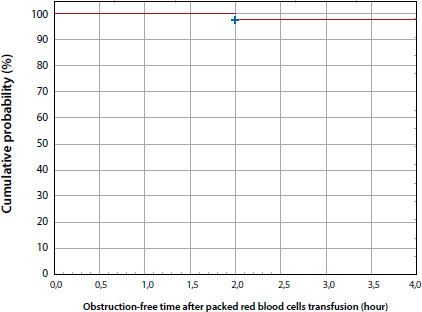
-
ORIGINAL ARTICLE09-23-2022
Validation of the Informal Caregiver Burden Assessment Questionnaire for Brazil – short version
Revista Brasileira de Enfermagem. 2022;75(4):e20210862
Abstract
ORIGINAL ARTICLEValidation of the Informal Caregiver Burden Assessment Questionnaire for Brazil – short version
Revista Brasileira de Enfermagem. 2022;75(4):e20210862
DOI 10.1590/0034-7167-2021-0862
Views0See moreABSTRACT
Objectives:
to cross-culturally adapt the short version of the Informal Caregiver Burden Assessment Questionnaire to the Brazilian culture and test its psychometric properties.
Methods:
the questionnaire was translated, adapted, and applied to a sample of 280 informal caregivers. The psychometric assessment was verified by estimating psychometric sensitivity and internal structure validity.
Results:
inter-rater agreement was satisfactory among specialists. In the seven-factor model, item (Q9) of the domain “Perception of Efficacy and Control Mechanisms” showed a factor loading less than 0.40 (ʎ = 0.26), and an alternative six-factor model was evaluated. However, both models showed excellent fit indices, and it was decided to keep the seven-factor reference model. Reliability was satisfactory for the seven subscales (α > 0.70).
Conclusions:
the questionnaire was adapted and showed adequate psychometric indices in the Brazilian context in which it was evaluated, preserving its original essence.
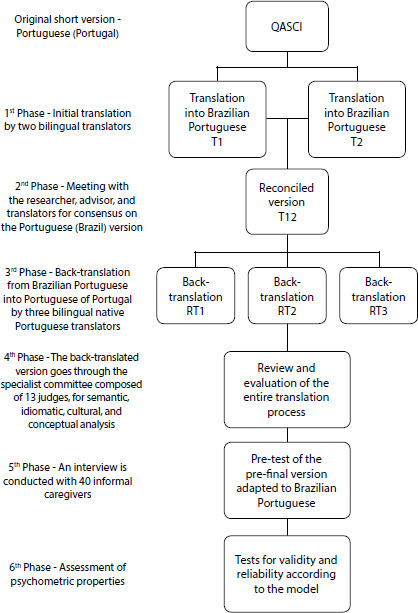
-
ORIGINAL ARTICLE09-23-2022
Analysis of the concept of cardiovascular risk: contributions to nursing practice
Revista Brasileira de Enfermagem. 2022;75(4):e20210803
Abstract
ORIGINAL ARTICLEAnalysis of the concept of cardiovascular risk: contributions to nursing practice
Revista Brasileira de Enfermagem. 2022;75(4):e20210803
DOI 10.1590/0034-7167-2021-0803
Views0See moreABSTRACT
Objectives:
to analyze the concept of cardiovascular risk to support nursing practice.
Methods:
this is an analysis to define the concept of cardiovascular risk, through the use of eight steps of Walker’s and Avant’s framework, using a literature review in indexed scientific journals.
Results:
cardiovascular risk is defined in a broad and original way as a context of health and nursing care that makes it possible to identify modifiable (cardiometabolic, behavioral, psychosocial, cultural and occupational) and non-modifiable (biological) risk factors for cardiovascular diseases that act as early and interrelated markers, of multiple and heterogeneous etiology, predisposing to cardiovascular vulnerability.
Conclusions:
with the analysis and definition of the concept of cardiovascular risk, we realized that it will be possible to base nursing practice, with implications in clinical practice for identifying and reducing risk factors for cardiovascular diseases, with nursing relevance in the care of these subjects.
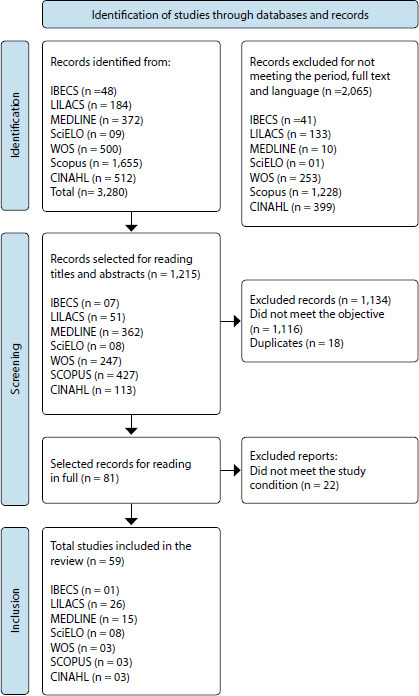
-
ORIGINAL ARTICLE09-23-2022
Brain death communication with parents of children and adolescents: care strategies
Revista Brasileira de Enfermagem. 2022;75(3):e20210943
Abstract
ORIGINAL ARTICLEBrain death communication with parents of children and adolescents: care strategies
Revista Brasileira de Enfermagem. 2022;75(3):e20210943
DOI 10.1590/0034-7167-2021-0943
Views0See moreABSTRACT
Objectives:
to identify care strategies developed by professionals from critically ill patients’ units in communicating BD with parents of children and adolescents.
Methods:
an exploratory and descriptive research with a qualitative approach, carried out in two health institutions between October and December 2019, through semi-structured interviews. Data analysis took place through content analysis.
Results:
twenty-one professionals participated. Three care strategies were identified: actual clinical situation in suspected brain death; sensitizing families to the real clinical situation after brain death diagnosis; and time to assimilate the death information.
Final Considerations:
the care strategies for communicating brain death to families identified in this study present the possibility of subsidizing health managers in training and support promotion for professionals in care practice. Moreover, they can be incorporated and validated in the care practice of the studied context.
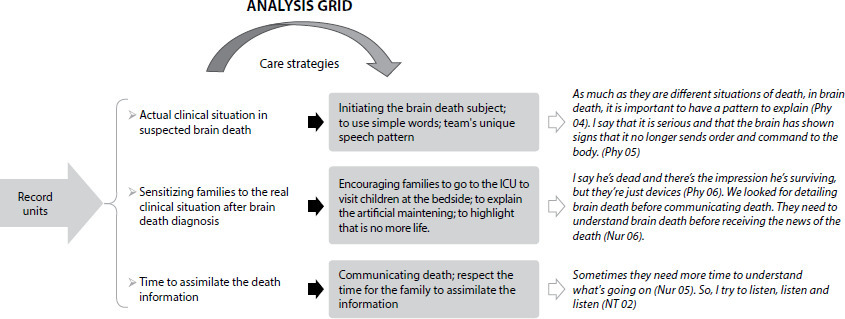
-
ORIGINAL ARTICLE07-08-2020
Self-efficacy in elderly with type 2 Diabetes Mellitus
Revista Brasileira de Enfermagem. 2020;73:e20180980
Abstract
ORIGINAL ARTICLESelf-efficacy in elderly with type 2 Diabetes Mellitus
Revista Brasileira de Enfermagem. 2020;73:e20180980
DOI 10.1590/0034-7167-2018-0980
Views0See moreABSTRACT
Objective:
to analyze the self-efficacy of elderly with type 2 diabetes mellitus and the relationship with sociodemographic, clinical, knowledge, and attitude variables.
Method:
a cross-sectional quantitative study conducted with 256 elderly people enrolled in Family Health Strategies. Data were obtained through interviews. Descriptive statistical analysis and multiple linear regression model were performed (p <0.05).
Results:
female, 69.95-year mean age, white skin color, 4-7 years of schooling, living with a partner, retirees, low individual monthly income, 6 to 15 years of illness, Catholics, living with children (with or without spouse). The elderly’s low knowledge and negative attitude prevailed. Self-efficacy was associated with attitude and knowledge in the domains “General and Specific Diet”, “Physical Exercise” and “Blood Glucose”.
Conclusion:
self-efficacy investigations in type 2 Diabetes Mellitus management in the elderly are important and encourage treatment adherence.
-
ORIGINAL ARTICLE09-18-2020
Nursing recommendations for facing dissemination of COVID-19 in Brazilian Nursing Homes
Revista Brasileira de Enfermagem. 2020;73:e20200260
Abstract
ORIGINAL ARTICLENursing recommendations for facing dissemination of COVID-19 in Brazilian Nursing Homes
Revista Brasileira de Enfermagem. 2020;73:e20200260
DOI 10.1590/0034-7167-2020-0260
Views0See moreABSTRACT
Objective:
to develop a protocol of recommendations for facing dissemination of COVID-19 in Brazilian Nursing Homes.
Method:
a study of experts’ recommendations using a structured form applied through the Delphi Technique, obtaining 100% agreement among professionals after four rounds of analysis. The population comprised six nurses members of the Scientific Department of Gerontological Nursing of the Brazilian Association of Nursing (Associação Brasileira de Enfermagem)
Results:
the protocol was structured in a nucleus of nursing interventions to face the spread of COVID-19 in Nursing Homes, consisting of 8 actions.
Final considerations:
the protocol can help nurse managers to organize assistance to face the pandemic, which can be adaptable to each reality, making training nurses and health teams easier.
-
ORIGINAL ARTICLE07-08-2020
Cognition and quality of life relationship among the elderly community: a cross-sectional study
Revista Brasileira de Enfermagem. 2020;73:e20190030
Abstract
ORIGINAL ARTICLECognition and quality of life relationship among the elderly community: a cross-sectional study
Revista Brasileira de Enfermagem. 2020;73:e20190030
DOI 10.1590/0034-7167-2019-0030
Views0See moreABSTRACT
Objective:
to assess cognitive functions and their association with quality of life among elderly people enrolled in a Family Health Unit (FHU) of Primary Health Care in Recife-PE.
Methods:
a quantitative, descriptive, cross-sectional study in which elderly aged 60 years and over were studied.
Results:
76.7% of the elderly were women and the age group was less than or equal to 70 years. 68.6% had cognitive impairment, and in the quality of life assessment it was found that the social participation facet had the highest mean score among the elderly (14.25), while the lowest was observed in the sensory functioning facet (9.10). There was an association between cognitive decline and quality of life.
Conclusion:
most of the elderly had good quality of life rates, but low cognitive level. Using screening tools allows early detection of health problems, guiding the nursing staff in the construction of preventive measures.

-
REVIEW12-05-2019
Health promotion of frail elderly individuals and at risk of frailty
Revista Brasileira de Enfermagem. 2019;72:319-327
Abstract
REVIEWHealth promotion of frail elderly individuals and at risk of frailty
Revista Brasileira de Enfermagem. 2019;72:319-327
DOI 10.1590/0034-7167-2018-0575
Views0See moreABSTRACT
Objective:
To identify interventions for the health promotion of frail elderly individuals and those at risk of frailty.
Method:
Integrative review of the literature performed in the following databases: LILACS, CINAHL, MEDLINE, Web of Science, COCHRANE and Scopus, using the
Descriptors:
“frail elderly”, “aging”, “health services for the aged” and “health promotion” combined with Boolean operators “AND” and “OR”.
Results:
Randomized controlled clinical trials (RCTs) classified as level of evidence II represented 82.6% of studies. Interventions were analyzed according to the following categories: Interventions for the elderly at risk of frailty and Interventions for the frail elderly.
Conclusion:
The following interventions were identified: educational multiprofessional group meetings, physical training, home visit/home care program, nutrition assessment and supplementation, health maintenance programs and cognitive training; models/programs of management and monitoring, use of assistive technology devices and hospitalization program for geriatric rehabilitation.

-
REVIEW12-21-2020
Skill acquisition of safe medication administration through realistic simulation: an integrative review
Revista Brasileira de Enfermagem. 2020;73:e20190880
Abstract
REVIEWSkill acquisition of safe medication administration through realistic simulation: an integrative review
Revista Brasileira de Enfermagem. 2020;73:e20190880
DOI 10.1590/0034-7167-2019-0880
Views0See moreABSTRACT
Objective:
to investigate evidence that indicates the contribution of realistic high, medium or low fidelity simulation to acquire knowledge, skills and attitudes in safe medication administration by nursing students.
Methods:
an integrative review of experimental studies from MEDLINE, LILACS, Web of Science, Scopus and Science Direct. The descriptors “nursing students”, “simulation”, “high fidelity simulation training”, “medication errors” and “pharmacology” were used to identify 14 studies that answered the research question, and were assessed for accuracy methodological level and level of evidence.
Results:
there was a sample of quasi-experimental studies, (level 3 of evidence; 78.6%) and randomized clinical trials (level 2 of evidence; 21.4%), whose expressive majority showed superiority of the simulation strategy over the traditional methodology (71.4%).
Conclusion:
using low and high fidelity simulators, standardized patients and virtual simulation can promote acquisition of essential skills for patient safety.

-
ORIGINAL ARTICLE10-21-2019
Child and adolescent violence: oral story of women who attempted suicide
Revista Brasileira de Enfermagem. 2019;72(6):1450-1456
Abstract
ORIGINAL ARTICLEChild and adolescent violence: oral story of women who attempted suicide
Revista Brasileira de Enfermagem. 2019;72(6):1450-1456
DOI 10.1590/0034-7167-2017-0814
Views0See moreABSTRACT
Objective:
To unveil expressions of intrafamily violence experienced in childhood and/or adolescence by women who attempted suicide.
Method:
This is a study with a qualitative approach based on Oral Story. Participants were ten women with a history of suicide attempt, who experienced intrafamily violence in childhood and/or adolescence. The research was carried out at the Center for the Study and Prevention of Suicide, linked to a Toxicological Information Center in the city of Salvador, Bahia, Brazil.
Results:
From the orality of women, the study allowed the emergence of the following representative categories of intrafamily abuse experienced in childhood and/or adolescence: psychological violence, rejection, neglect, physical violence and sexual violence.
Final considerations:
The study alerts to intrafamily violence as an aggravation related to suicidal behavior, offering elements that help in the identification of their expressions, which will raise awareness to suicidal behavior and consequently suicide prevention.
-
ORIGINAL ARTICLE10-28-2020
Conflict management strategies used by Portuguese nurse managers
Revista Brasileira de Enfermagem. 2020;73:e20190336
Abstract
ORIGINAL ARTICLEConflict management strategies used by Portuguese nurse managers
Revista Brasileira de Enfermagem. 2020;73:e20190336
DOI 10.1590/0034-7167-2019-0336
Views0See moreABSTRACT
Objectives:
to analyze the perception and conflict management strategies used by nurses in the management of people in Portuguese health services.
Methods:
descriptive, correlational study, carried out in Portuguese health services, with an intentional non-probabilistic sample, totaling 95 nurse managers. A questionnaire and Conflict Management Scale were used, analyzing the variables of managerial activities and conflict management, with the aid of software.
Results:
it was identified that 60% of the managers, report having to mediate conflicts daily, and the majority report adopting dialogue in conduct. However, through the Kruskal-Wallis test, it was shown that enforcement strategies in conflict management prevail (p = 0.008), with collaborative ones being more restricted to monthly intervals (p = 0.049).
Conclusions:
managers perceive the importance of collaboration in the mediation of conflicts, however, in their daily lives; they tend to maintain imposing behaviors, signaling for a little transformational leadership style.

-
ORIGINAL ARTICLE05-18-2020
Expert assessment of the “Neonatal Pain Assessment Program” online course
Revista Brasileira de Enfermagem. 2020;73(4):e20180392
Abstract
ORIGINAL ARTICLEExpert assessment of the “Neonatal Pain Assessment Program” online course
Revista Brasileira de Enfermagem. 2020;73(4):e20180392
DOI 10.1590/0034-7167-2018-0392
Views0See moreABSTRACT
Objectives:
to assess layout quality, visual identity and content of the “Neonatal Pain Assessment Program” (Programa de Avaliação da Dor Neonatal) online course.
Methods:
a descriptive exploratory study. The course was assessed by 24 experts in pain, neonatology and education. A form containing 20 questions on technical, interface and educational aspects was used. For each item, the score ranged from 0 to 1. Mean scores above 0.7 were considered indicative of high quality of the items. Descriptive statistics were used for data analysis.
Results:
navigation, clarity, ease of localization, content relevance, contextualization, content correction, multiple windows, ease of use, ease of return, ergonomics, esthetics, special brands, audiovisual resources, information and portability were assessed. All aspects obtained a mean ≥ 0.70 and no changes were required.
Conclusions:
the Neonatal Pain Assessment Program is considered as quality educational technology and promising strategy for health education.
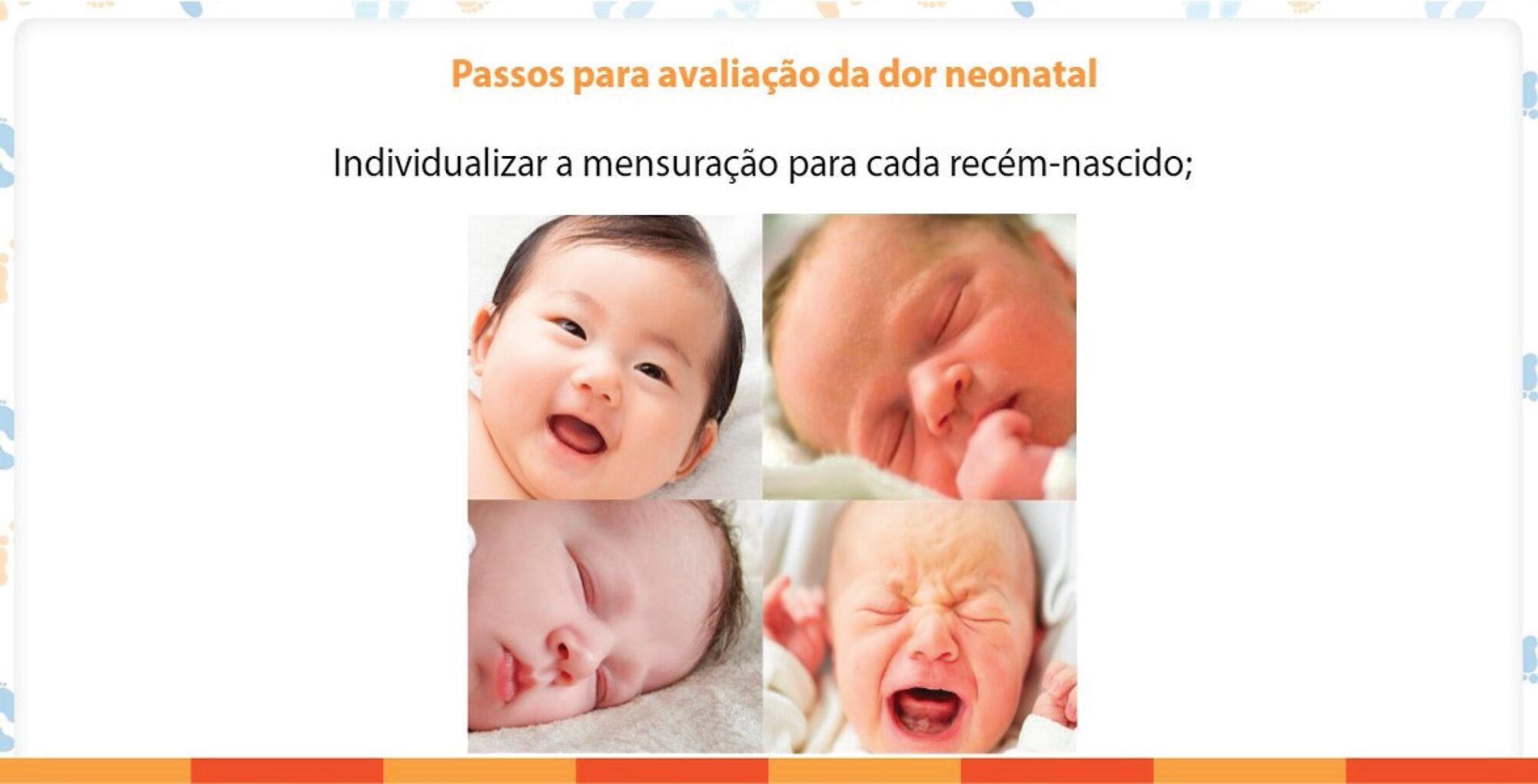
Search
Search in:
Nuvem de Tags
Adolescente (85) Atenção Primária à Saúde (239) COVID-19 (91) Criança (91) Cuidados de Enfermagem (269) Educação em Enfermagem (151) Educação em Saúde (139) Enfermagem (930) Enfermagem Pediátrica (86) Estudantes de Enfermagem (77) Estudos de Validação (131) Família (87) Idoso (208) Promoção da Saúde (99) Qualidade de Vida (104) Saúde do Trabalhador (86) Saúde Mental (145) Saúde Pública (82) Segurança do Paciente (150) Tecnologia Educacional (100)



